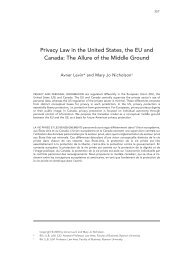Commentary on Fichte's “The Illegality of the Unauthorised ... - uoltj
Commentary on Fichte's “The Illegality of the Unauthorised ... - uoltj
Commentary on Fichte's “The Illegality of the Unauthorised ... - uoltj
You also want an ePaper? Increase the reach of your titles
YUMPU automatically turns print PDFs into web optimized ePapers that Google loves.
152 university <strong>of</strong> ottawa law & technology journal www.<strong>uoltj</strong>.ca<br />
<strong>the</strong> author’s need to harm<strong>on</strong>ise her thoughts with those <strong>of</strong> o<strong>the</strong>rs. This will to<br />
communicate, which ensures that <strong>the</strong> acquisiti<strong>on</strong> <strong>of</strong> <strong>the</strong> author’s ideas is not a<br />
violati<strong>on</strong> <strong>of</strong> <strong>the</strong> author’s right, is expressed in Fichte’s asserti<strong>on</strong> that no-<strong>on</strong>e could<br />
wish to “teach facing empty walls” or “write books which no-<strong>on</strong>e reads.” 53<br />
In c<strong>on</strong>trast to <strong>the</strong> right <strong>of</strong> <strong>the</strong> public to use <strong>the</strong> ideas c<strong>on</strong>tained in <strong>the</strong><br />
work, <strong>the</strong> right to appropriate and use <strong>the</strong> form in which <strong>the</strong> ideas are expressed<br />
is not transferred to <strong>the</strong> purchaser. The form <strong>of</strong> <strong>the</strong> expressi<strong>on</strong> is a creati<strong>on</strong> <strong>of</strong><br />
<strong>the</strong> author; it is a unique expressi<strong>on</strong> <strong>of</strong> her pers<strong>on</strong>ality. It follows from this that<br />
any use or appropriati<strong>on</strong> <strong>of</strong> <strong>the</strong> form entails a violati<strong>on</strong> <strong>of</strong> <strong>the</strong> pers<strong>on</strong>ality <strong>of</strong> <strong>the</strong><br />
author. Ins<strong>of</strong>ar as <strong>the</strong> reprinting <strong>of</strong> a book without <strong>the</strong> permissi<strong>on</strong> <strong>of</strong> <strong>the</strong> author<br />
represents an appropriati<strong>on</strong> <strong>of</strong> <strong>the</strong> author’s pers<strong>on</strong>ality against her will, it is an<br />
infringement <strong>of</strong> her individuality, which is protected as her natural right in virtue<br />
<strong>of</strong> her pers<strong>on</strong>hood.<br />
With regard to <strong>the</strong> uniqueness <strong>of</strong> ideas, Fichte argues that while ideas can<br />
be appropriated by o<strong>the</strong>rs, <strong>the</strong> c<strong>on</strong>necti<strong>on</strong>s between ideas and <strong>the</strong> way in which<br />
<strong>the</strong> ideas are expressed are unique to every individual. He uses two arguments to<br />
prove this propositi<strong>on</strong>. First, he argues that from a probabilistic point <strong>of</strong> view, it is<br />
highly unlikely that two people who do not know each o<strong>the</strong>r well would c<strong>on</strong>nect<br />
ideas or represent <strong>the</strong>m in <strong>the</strong> same way. 54 His sec<strong>on</strong>d argument is that, not <strong>on</strong>ly is<br />
it highly unlikely that two people would structure <strong>the</strong>ir thoughts in <strong>the</strong> same way,<br />
in fact, in absorbing ideas from o<strong>the</strong>rs or from <strong>the</strong> external world, it is impossible<br />
that <strong>the</strong>se thoughts be given <strong>the</strong> same form or be c<strong>on</strong>nected to o<strong>the</strong>r thoughts in<br />
<strong>the</strong> same was as <strong>the</strong>y were in <strong>the</strong> minds <strong>of</strong> o<strong>the</strong>rs. This is because ideas must be<br />
represented through images, and <strong>the</strong> <strong>on</strong>ly images available to <strong>the</strong> individual are<br />
her own. Without access to <strong>the</strong> minds <strong>of</strong> o<strong>the</strong>rs, <strong>the</strong>re can be no similarity between<br />
<strong>the</strong> c<strong>on</strong>necti<strong>on</strong>s <strong>of</strong> ideas in <strong>the</strong> mind <strong>of</strong> <strong>on</strong>e individual and <strong>the</strong> c<strong>on</strong>necti<strong>on</strong>s in <strong>the</strong><br />
mind <strong>of</strong> ano<strong>the</strong>r. Whenever a pers<strong>on</strong> reads a book, <strong>the</strong> ideas c<strong>on</strong>tained in it are<br />
appropriated by <strong>the</strong> reader into his thoughts and given <strong>the</strong> unique form that <strong>the</strong><br />
reader’s mind generates by analogising <strong>the</strong> ideas <strong>of</strong> <strong>the</strong> author with <strong>the</strong> ideas<br />
and c<strong>on</strong>necti<strong>on</strong>s between ideas present in <strong>the</strong> mind <strong>of</strong> <strong>the</strong> reader. As Fichte says,<br />
“everything that we are to think must be thought in terms <strong>of</strong> <strong>the</strong> analogy with our<br />
o<strong>the</strong>r ways <strong>of</strong> thinking,” 55 and as a result, our appropriati<strong>on</strong> <strong>of</strong> <strong>the</strong> ideas in a book<br />
necessarily involves giving <strong>the</strong>m a new form unique to <strong>the</strong> reader.<br />
It would seem to follow from this argument that <strong>the</strong> appropriati<strong>on</strong> <strong>of</strong> <strong>the</strong><br />
way in which <strong>the</strong> author expressed a series <strong>of</strong> ideas is a violati<strong>on</strong> <strong>of</strong> <strong>the</strong> unique<br />
pers<strong>on</strong>ality <strong>of</strong> <strong>the</strong> author, who has given form to ideas that no <strong>on</strong>e else was<br />
capable <strong>of</strong> giving <strong>the</strong>m. Fichte expresses this c<strong>on</strong>clusi<strong>on</strong> somewhat obscurely by<br />
claiming that, because it is impossible for ano<strong>the</strong>r to appropriate <strong>the</strong> form <strong>of</strong> ideas<br />
given by <strong>the</strong> author to <strong>the</strong>m, <strong>the</strong> author could not have intended that <strong>the</strong> form <strong>of</strong><br />
<strong>the</strong> thoughts and <strong>the</strong> means by which <strong>the</strong>y are expressed be transferred to <strong>the</strong><br />
reader. Through this obscure formulati<strong>on</strong>, Fichte emphasizes <strong>the</strong> innate right <strong>of</strong><br />
<strong>the</strong> individual to c<strong>on</strong>trol aspects <strong>of</strong> her own pers<strong>on</strong>ality.<br />
One could argue that if it is impossible for a reader to appropriate <strong>the</strong><br />
form given to ideas by <strong>the</strong> author, <strong>the</strong>n <strong>the</strong> reproducti<strong>on</strong> <strong>of</strong> <strong>the</strong>se ideas ought not<br />
53. Fichte, “Pro<strong>of</strong> <strong>of</strong> <strong>the</strong> <strong>Illegality</strong> <strong>of</strong> <strong>the</strong> Reproducti<strong>on</strong> <strong>of</strong> Books,” supra note 2 at para. 6.<br />
54. Fichte, “Pro<strong>of</strong> <strong>of</strong> <strong>the</strong> <strong>Illegality</strong> <strong>of</strong> <strong>the</strong> Reproducti<strong>on</strong> <strong>of</strong> Books,” supra note 2 at para. 8.<br />
55. Fichte, “Pro<strong>of</strong> <strong>of</strong> <strong>the</strong> <strong>Illegality</strong> <strong>of</strong> <strong>the</strong> Reproducti<strong>on</strong> <strong>of</strong> Books,” supra note 2 at para. 8.









